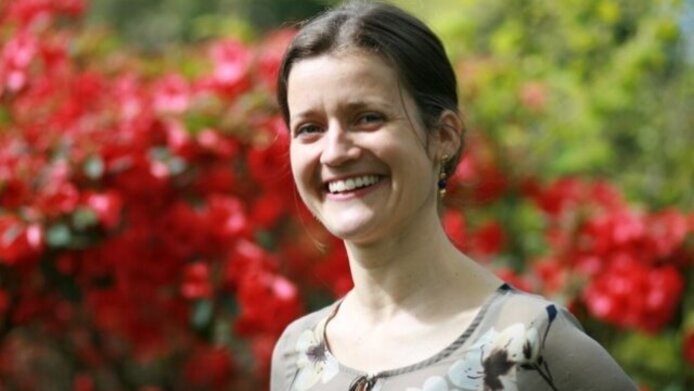“You have to show a pugnacious side”

Feeling fitter at 40 than at 25? Running a marathon at 50 and making a fresh start in your career? Anti-aging guides advising us on how to grow old without looking and feeling the part are published on a weekly basis. It is understood that healthy eating and regular exercise are mandatory to keeping youthful and resilient. However, though theories are copious, the actual factors of age progression remain unclear.
Mouse research
Teresa Valencak, who is an Associate Professor at the Research Institute of Wildlife Ecology at the University of Veterinary Medicine in Vienna, has been studying the mechanisms of aging for many years by examining the metabolism of suckling labatory mice. “During their lactation period, which lasts 18 days, the mice's standard metabolic rate increases eightfold. Tour de France riders, by comparison, only achieve sixfolds”, Valencak explains. “We currently believe that our life span increases with a higher basal metabolism. Yet, there is also another hypothesis which suggests that a steady metabolic rate guarantees a longer life.”
Cool climates and their life extending benefits
Temperature has proven to play a key role in life expectancy: Female mice that raise their offspring at an ambient temperature of 15 ºC live 2,5 months longer than those kept at 22 ºC. The males survive 610 days on average when kept at 22 ºC but die 30 days earlier than those females that are kept in a 15 ºC climate. Valencak interprets the positive impact of cool temperatures on life expectancy as an effect of “uncoupled breathing”, which is typical of the thermoregulation of small mammals: Whenever they get cold, the mitochondria from their brown adipose tissue is turned into body heat. During this process the production of free oxygen radicals, which are thought to be decisive in the aging process, is severely decreased.
The crucial role of omega-3 fatty acids
Another hypothesis that supports the idea of the negative impact of free radicals on aging is the “membrane pacemaker hypothesis”. It says that animals' lives are the shorter the more unsaturated fatty acids are stored in their cell membranes, since those tissues are more likely to be attacked by free radicals. Valencak plans to test this theory on a laboratory-bred, particularly tiny species of mice, the Ames dwarf mouse. It lacks the gene that is responsible for the production of growth hormones and therefore suffers from dwarfism and infecundity. Yet, its life span is significantly higher: While mice of average length live up to three years, Ames dwarf mice reach a maximum of five years. Moreover, their body heat is almost two degrees lower than that of their generic relatives. According to the membrane pacemaker hypothesis, their membranes only contain a small number of unsaturated fatty acids. But Valencak might prove that assumption wrong: She has discovered that the amount of unsaturated fatty acids found in the tissues of Ames dwarf mice equals that of generic mice. However, Ames dwarf mice clearly show a lower quantity of Omega-3 fatty acids. An indication that Omega-3 fatty acids in particular could be crucial to the length of an individua's lifespan.
The obesity epidemic
Another aspect of Valencak`s work is a project on obesity, which has led her to China. “Many of the body's own fat burning mechanisms don't function in obese people. We observed that mice, when fed very good food, like e.g., schnitzel on a daily basis, put on a lot of weight. But gravid females return to their original slim
shapes after their lactation period, which implies that their additional fat has been shed by milk production and labor during reproduction. If we managed to understand the underlying mechanisms, we could get hold of the global obesity epidemic”, Valencak claims. She considers adiposity an enormous problem for China and its huge population: There are already as many severly overweight individuals in the People's Republic as in the USA. “This is alarming because a massive number of obese adolescents will suffer from type 2 diabetes in the foreseeable future ”, Valencak warns. According to her, the reasons for this development are the growing consumption of meat and fat, the country`s one-child policy, but also cultural traditions that equate high status with corpulence.
Research in China
The project, which is sponsored by the National Science Foundation of China, “the Chinese FWF”‚ is dedicated to discovering if metabolic profiling, that is, taking samples of blood, urine and feces, can provide information on what has been absorbed, metabolized and stored by the laboratory animals and, consequently, also by human beings. “We know that there are differences between ethnic groups in that respect. In Asia, for example, lactose intolerance is common. We also assume that Asians have a problem with mobilizing and reducing fat”, Valencak elucitates.
“Foreign experts” in China
Six times a year the biologist travels to Bejing and stays there for a couple of weeks. What she particularly enjoys about the Chinese is their friendliness. To her amazement, not many colleagues follow suit, although it is fairly easy to get a scholarship: “The Chinese welcome you with open arms, they consider you as someone who can help their country progess. They call you a ‘foreign expert’, provide you with a chinese ID and a ‘foreign expert certificate’ which allows for entry into many institutions”, Valencak enthuses. “But many colleagues are put off by pollution and the simple life in general.” She talks of cleaning for hours and setting up cockroach traps when returning to her shared apartment in Bejing. Another fact that deters people is safety: “In Austria it's strictly prohibited to transport liquid nitrogen in an elevator. Here, they walk up to the eighth floor with it while we use 80 liter tanks. Moreover, if you don't have a good command of Mandarin, you can feel very lonely”, she recounts. Animal protection is also a crucial point in putting off people: “Although there are ethics commissons, it`s hardly any problem to get through with a good project.” This is a critical aspect for her as well, since animal welfare is a matter close to her heart. However, she has come to terms with circumstances: “You need to adopt a different attitude. You have to accept that you're in Asia. It's just different here.”
Floating tyres and the secret police
Minor culture clashes are common. Two thirds of the Chinese cannot swim, for instance. This is why even adults use floating tyres and water wings. “A sight, I
will never forget”, Valencak laughs. She believes that “due to pollution nobody dares to swim in the sea or the rivers”. Moreover, swimming is not regarded as appropriate for “decent girls” either. But, apart from the hospitality of its native inhabitants, it is above all the lack of crime Valencak values about China: “Bejing is the safest city I have ever lived in so far.” Her notebook, for example, which she forgot about and left behind a couple of times, has always been returned to her. When it comes to politics, however, she is aware that “we think differently about non-confinement and the like”. Yet, she concedes that “guiding such a huge nation is a complex affair”. Her mother, who is of Hungarian descent and still remembers her native country`s former secret police, has conscientized the biologist. She therefore instantly recognizes Chinese plainclothes officers by focussing on details such as their shoes: They usually wear police footwear, and they speak English as well.
Vienna, Aberdeen, Bejing
In supervising theses written in Vienna, Aberdeen and Bejing, Valencak has noticed significant cultural differences: “Chinese students are highly motivated and sometimes even too ambitious. Simultaneously, they show an unbelievable acquiescence to authority. What perturbs me, though, is their attitude towards
animals: They are only means to an end to them.” Students in Aberdeen, by comparison, are described as very creative and critical by her. She attributes these qualities to their being actively trained in problem solving. Viennese students are the most meticulous: “We`re somewhere in the middle between the Chinese and the Anglo-Saxon applied system.” But Valencak wants the Austrian system to gradually approximate the Anglo-Saxon model: “We have to catch up on teaching our students critical thinking. Relying on twitter, facebook and google is counterproductive to achieving good scienctific results”, she emphasizes.
“Nothing is impossible”
Viennese students often complain about “unfeasible” tasks. But Valencaks attitude has always been: “Nothing is impossible.” At the age of ten the biologist already knew that she wanted to become a scientist. Having devoured the books of Thor Heyerdhal, she remembers: “I enjoyed immersing myself in a topic area, reflecting on it for some time and feeling smarter afterwards.” Upon entering university, however, the former student of an Upper Austrian academic high school with its focus on modern languages had a tough time catching up on chemistry and physics. But her “innate stubbornness”, as she puts it, made her persevere. A personal trait that she credits as her formula for success: “I'm not motivated by outside approval but only by my own achievements.
“Loosening hierarchies”
Valencak has noticed, though, that her female colleagues are very often looking for approval from others. She is convinced that this attitude is impedimental to carving out a career for oneself in science, especially since women often find themselves in insecure positions, working part-time on projects of limited duration. “They are doing a very good job, but they don't get any recognition”, Valencak states. Therefore, she is convinced that you have to be motivated by your interests only. Some of her female colleagues were put off by “departmental and commissional work duties and the rough atmosphere”. But “Science is a pushy business, it's a play of forces. You have to assume a role and never take anything personally, yet the latter is exactly what women tend to do”, Valencak regrets. She “has learned to act a part”, for her own experience has taught her that it is vital “to show a pugnacious side to succeed”. Nevertheless, she is convinced that loosening hierarchies is the only way to go, since “international groups that lack hierarchical structures are the most successful of all”. She consequently suggests: “First, we have to rid ourselves of hierarchcies, then the gender issues will be tackled as well.”
“The FWF is fair”
In terms of personal development, Valencak says that she has vastly profited from coachings organized by the FWF and therefore strongly recommends them to her female colleagues. She credits the FWF in particular with her wish to remain located in her native country: “Conditions are fair in Austria. If you don't succeed immediately, you can try again, you do stand a chance.”
Mentoring and coordinating
Looking into the future, the 36-year-old sees herself as a mentor and coordinator. She plans to establish a working committee that focusses on „fundraising, planing papers and putting things into context” and will leave research to the following generations: “Of course that`s something I regret but it`s only natural, you have to make way for the younger ones.”
Teresa Valencak studied biology with a focus on zoology at the University of Vienna. In 2007 she completed her Ph.D. and specialized on researching the correlations of metabolism and aging in the USA and Great Britain. From 2008 to 2010 she was awarded the Herta Firnberg research grant, and since 2010 she has held the Elise Richter position at the University of Veterarinary Medicine of Vienna. Since 2012 she has also been doing research at the University of the Chinese Academy of Science in Bejing. In March 2014 she was awarded the venia legendi from the University of Veterarinary Medicine of Vienna.





